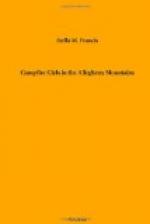OR
“A Christmas Success Against Odds”
By Stella M. Francis.
* * * * *
CHAPTER I.
The grand Council fire.
“Wo-he-lo for aye,
Wo-he-lo for aye,
Wo-he-lo, Wo-he-lo, Wo-he-lo
for aye!
Wo-he-lo for work,
Wo-he-lo for health,
Wo-he-lo, Wo-he-lo, Wo-he-lo
for love.”
Two hundred and thirty-nine girl voices chanted the Wo-he-lo Cheer with weird impressiveness. The scene alone would have been impressive enough, but Camp Fire Girls are not satisfied with that kind of “enough.” Once their imagination is stimulated with the almost limitless possibilities of the craft, they are not easily pleased with anything but a finished product.
The occasion was the last Grand Council Fire of Hiawatha Institute for Camp Fire Girls located in the Allegheny city of Westmoreland. The classroom work had been rushed a day ahead, examinations were made almost perfunctory, and for them also the clock had been turned twenty-four hours forward. The curriculum was finished, and the day just closed had been devoted to preparation for a Grand Council wind-up for the fifteen Fires of the Institute, which would “break ranks” on the following day and scatter in all directions for home and the Christmas holidays.
And there was literal truth in this “break ranks” method of dismissing school at the Institute. Since the United States entered the European war on the side of the anti-frightfulness allies, Hiawatha had become something of a military school. The girls actually drilled with guns, and they would shoot those guns with all the grim fatality of so many boys. Not that they expected to go to war and descend into the trenches and fire hail-storms of steel-coated death-messengers at the enemy. Oh, no. They might, but they were sensible enough not to let their imagination carry them so far. But preparedness was in the air, and the girls voted to a—a—girl (I almost said man, for they were as brave as men in many respects) to take up military drill and tactics two hours a week as a part of their curriculum.
Madame Cleaver, head of the Institute, did not start the military movement rashly. She was carefully diplomatic in the conduct of her school, for she must satisfy the critical tastes and ideas of a high-class parentage clientele. But she also kept her fingers on the pulse of affairs and knew pretty well how to strike a popular vein. Hence the membership of her classes was always on the increase. Indeed, at the beginning of this school year, she had to turn away something like forty applicants, for want of room and accommodations.
Hiawatha Institute was founded as a Camp Fire Girls’ school, and when Uncle Sam became involved in the European war, the national need for nurses appealed strongly to Camp Fire Girls everywhere. What could they do? The very nature of the training of the girls from Wood Gatherer to Torch Bearer made the question, so far as they were concerned, a self-answering one. They had all the broad commonsense rudiments of nursing. With some advanced science on top of this, they would be experts.




